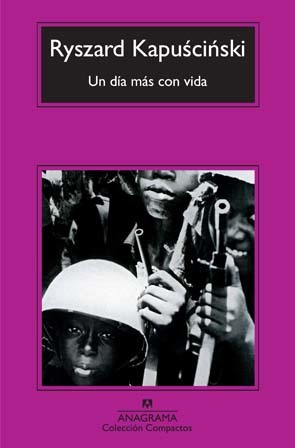What do you think?
Rate this book


184 pages, Paperback
First published January 1, 1976
Confusão is a good word, a synthesis word, and everything word. In Angola it has its own specific sense and is literally untranslatable. To simplify things: Confusão means confusion, a mess, a state of anarchy and disorder. Confusão is a situation created by people, but in the course of creating it they lose control and direction, becoming victims of confusão themselves. There is a sort of fatalism in confusão.Ryszard Kapuściński is a long term foreign correspondent, based in Luanda, who lives day to day or week to week. He travels with the MPLA officers, or truckloads of troops, with the Cuban mercenaries or in shared cars. He visits the fronts (which are constantly moving) and cities (which change hands frequently). Every roadblock is potentially the end, if it is not a MPLA roadblock... - but all the soldiers wear the same ragtag uniforms, made up of bits a pieces of clothing, making it near impossible to tell who is who.
"In Europe," he said, "they taught me that a front is trenches and barbed wire, which form a distinct and visible line. A front on a river, along a road or from village to village. You can trace it on a map with a pencil or point to it on the terrain. But here the front is everywhere or nowhere. There is too much land and too few people for a front line to exist... This is a war of ambushes. On any road, at any place, there can be a front. You can travel the whole country and come back alive, or you can die a metre from where you're standing. There are no principles, no methods. Everything comes down to luck and happenstance. This war is a real mess. Nobody knows just where they stand."I hadn't realised this was his first book, published in 1976. This edition contained some updates in the last section - a timeline of Angola, through to 2000 (it's a 2001 Penguin edition).
Жу-Жу – політичний комісар генерального штабу армії MPLA і щоденно о восьмій вечора виголошує по радіо донесення про ситуацію на фронтах ангольської війни. Донесення ці звучать патетично, оскільки в їх писання Жу-Жу вкладає всю свою душу і почуття. [...] Якщо ситуація сприятлива, донесення Жу-Жу короткі й спокійні. Факти говорять самі за себе, в добрих речах не треба переконувати. Якщо ж однак щось починає псуватися, якщо починає бути зле, донесення стають розлогими й заплутаними, у них з’являється безліч прикметників, множаться похвали на власну адресу й епітети, що висміюють противника. Я йду вулицям Луанди, і через відчинені вікна до мене доноситься голос Жу-Жу. На такій віддалі не чути слів, але оскільки він говорить тільки хвилю, я знаю, що все добре, що вистояли, що щось здобули. Учора ж я пройшов половину міста, а Жу-Жу все говорив і говорив. Щось вочевидь рвалося на фронті. На мене накотилася тисяча сумнівів: чи зможуть утриматися, чи переможуть?
The next prisoner looks twelve. he says he's sixteen. He knows it is shameful to fight for the FNLA, but they told him that if he went to the front they would send him to school afterward. he wants to finish school because he wants to paint. if he could get paper and a pencil he could draw something right now. He could do a portrait. he also knows how to sculpt and would like to show his sculptures, which he left in Carmona. he has put his whole life into it and would like to study, and they told him that he will, if he goes to the front first. he knows how it works - in order to paint you ust first kill people, but he hasn't killed anyone.